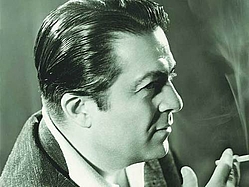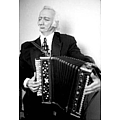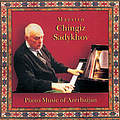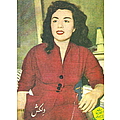Rashid Behbudov Biography
Rashid Behbudov (December 14, 1915 - June 19, 1988) was an Azerbaijani singer and actor. He sang in Azerbaijani, Russian, Persian, Turkish, Hindi, Urdu and Bengali among other languages. He became popular when he played the lead role of Askar, the wealthy peddler, in a movie Arshin Mal Alan ("The Cloth Peddler") which was based on a 1913 musical comedy by Uzeyir Hajibeyov. Rashid's father, Majid Behbudlu was a well-known singer too. He toured and performed concerts in several countries including: the United Kingdom, Finland, Iran, Turkey, China, Albania, Bulgaria, Belgium, Ethiopia, India, Iraq, Chile, Argentina. In Azerbaijan, the name Rashid Behbudov is automatically linked to the history of Azeri popular music. His vocal masterpieces range from proud hymns devoted to the beauty of the Motherland to tender, lyrical confessions of love. He is especially remembered for his portrayal of Askar, the rich, merchant in search of love in the 1945 movie version of Uzeyir Hajibeyov's music comedy, "Arshin Mal Alan." Rashid Behbudov's rare talent did not develop overnight. However, once he was discovered, his fame spread like wild fire, and he toured tirelessly, giving concerts one after another all over the world. Even though travel for those who lived behind the "Iron Curtain" was generally restricted, exceptions were made for Rashid. In 1966 he created the State Song Theater and became its soloist and Artistic Manager. The Cloth Peddler Rashid was almost 30 years old when he was tapped to play the lead role of Askar, the wealthy peddler, in the third (1945) version of the black-and-white film based on Uzeyir Hajibeyov's 1913 musical comedy, "Arshin Mal Alan" (The Cloth Peddler). Askar was the rich merchant, who disguised himself as a cloth peddler just to get the chance to enter the courtyards of homes so that he could catch a glimpse of all the pretty young women and choose one for his wife. At that time, women were traditionally veiled in Azerbaijan. This version of the movie came on the heels of World War II and was so successful that it not only made Rashid famous, but it won Hajibeyov the coveted Stalin Prize. When the directors were getting ready to cast the film, one of them, Reza Tahmasib, had thought he would offer Rashid the role of Vali, Askar's servant. Vali's character was comical, a trait which came naturally for Rashid. However, during the audition, Tahmasib heard Rashid sing an aria written for Askar and decided to give him the lead role instead. The film turned out to be so successful that it was shown in more than 25 countries. Those who had opposed Tahmasib's casting earlier decision thanked him for his perception and farsightedness. Iran and Turkey Rashid often performed in the Near East. In Iran, he was accompanied by the pianist Chingiz Sadigov and tar player Ahsan Dadashov. They were so popular that their two-week tour in Iran stretched into two months. His first concert in Turkey took place in 1961 with the talented violin player Azad Aliyev. The concerts in Ankara and Istanbul were extremely successful as well. As Azad Sharifov reports: I was lucky enough to see one of his concerts in Ankara in 1966. At that time, I was a correspondent for the newspaper "Izvestiya." It was his tenth concert on that tour. The concert hall was sold out, but I decided to try to go anyway. Fortunately, Rashid's manager saw me and motioned for me to follow him backstage. There I found Rashid pacing the floor. The manager cautioned me, "He's getting ready to go on stagebetter not disturb him right now." I stood silently as if frozen. Suddenly, Rashid looked up, recognized me and came and hugged me. "Where have you been for so long?" he asked. "If you only knew how much I miss Baku and my daughter. Thank God, I'll be flying back tomorrow. So good of you to come. After the concert, let's have dinner together." I remember that the Turkish audience that night knew all of Rashid's repertoire by heart and sang along with him. South America Rashid was a sociable person; he loved getting together with friends. In the meetings in Moscow in the Artists' Union, Rashid used to meet friends like composer Zakir Bagirov, artist Toghrul Narimanbeyov and artist Tahir Salahov. At these gatherings, Rashid used to tell stories about his South American tours 56 flights and landings in total. Some concerts were even held at extremely high altitudes (4,200 meters above sea level). During intermission, they used to offer him an oxygen tank, instead of the usual cup of tea. Rashid wrote home to his wife, Jeyran, that the concerts in Chile were especially difficult because of the ongoing political crisis there: "My dear ones, this is the tenth day of our dangerous tour. Wherever we go by bus, we are accompanied by soldiers. Sometimes we can hear shooting in the distance. I'm rushing off to a concert which will take place at the Opera Theater which is the same building in which Russian singer Fedor Shalyapin, Russian composer and pianist Anton Rubinstein and American violinist Menuhin have all given concerts. At each of these concerts we have taken the audience by storm. Each has been a success. I'm so happy to get the chance to pave a way for Azerbaijani songs. But I want to see you. All the best. Kissing you, especially my little Rada. Your father, Rashid. August 5, 1973." India Rashid was also very popular in India and gave six concerts there. His first appearance was in 1952. Rashid sang Azerbaijani songs and then several songs in Hindi, Urdu and Bengali. It was a sensation. Members of the audience told him that he sang Indian songs just like a native. In India, he toured Delhi, Mumbai (Bombay) and Calcutta. It was in India that he first met the great Indian actor Raj Kapoor and the actress Nargiz. They remained friends for the rest of their lives. Later, Rashid wrote a book about his trip to India entitled "In Far India." A year later in 1953, Rashid went back to India with a group of famous Soviet musicians. This time he returned as a familiar face. Many people throughout the country knew him. At each concert, he was asked to sing the most popular Indian song at the time, "India is the Best Country." It was on this trip that something extraordinary happened. Rashid's train was on its way to Hyderabad. Suddenly, a huge crowd of Indians surrounded the train, holding flashlights, fruit and flowers. They made the train come to a stop and insisted that Rashid sing for them. So he obliged and stood in the doorway of the train and entertained the crowd by singing Azerbaijani and Indian songs. Eventually, the train was able to proceed. Official Honors Even though Rashid was extremely popular, official recognition of his contributions to the performing arts was late in coming. The title of "People's Artist of the USSR," the highest honor that could be given to an artist, had to be approved by the Kremlin. But the Soviet government balked and made excuses. They would admit that he was great, but then would add disparagingly, "But he's just a pop singer, not an opera singer." But Rashid was not just a pop singer. He could handle extremely complicated opera roles as well which he proved in the portrayal of Balash in Fikrat Amirov's opera, "Sevil" ( 1953). This work is based on the storyline of a dramatic play of the same name by Jafar Jabbarli earlier in the century. The opera is characterized by its bright and colorful national melodies. Amirov himself offered the part of Balash to Rashid Behbudov. In May 1959, a grand display of Azerbaijani talent went on display in Moscow during the cultural event dubbed "The Decade of Azerbaijan Culture." During the Soviet period, the Kremlin went to great lengths to create the illusion that the many ethnicities of its vast conquered lands were "one big happy family." They often created cultural events to foster and cultivate this belief. But it provided a chance for the various republics to make their art known throughout that vast land that spanned ten time zones. Amirov's "Sevil" was performed at this event with Rashid playing the role of Balash. He demonstrated an unusual brilliancy and talent and for this he was finally awarded the coveted title of "People's Artist of the USSR." Song Theater It was Rashid's dream to create a place in Azerbaijan specifically designated as a Song Theater. Prior to the Soviet occupation, Baku already had an Opera and Ballet Theater, a Philharmonic Hall, a Comedy Theater and various other buildings dedicated to various genres of music, but nowhere was there a home for the genre of popular music. Behbudov was already an established musician when he decided to undertake this project. He envisioned each song as a mini-spectacle with its own heroes, theme and development and he went in search of a worthy setting where the dramatic aspects of these popular songs could be dramatically presented. Creating the Song Theater became a pet project for him. He was very proud of it and spent a great deal of energy, anxiety and time on the conversion of a pre-Soviet Jewish synagogue into the Song Theater. Simultaneously, he worked on creating a professional music group that would be associated with the theater. But in the spring of 1989, all these projects soon came to an end. The theater was preparing a new program for the Noruz holidays (the Spring Solstice on March 21 celebrating the New Year). Rashid looked fine despite his age of 74. His voice was still so strong and beautiful. But suddenly, during one of the practices, he took ill. With great difficulty, his friends managed to get him to Moscow to the Kuntsevo Hospital, which was considered the best hospital in the Soviet Union at the time. Doctors struggled to save him. But it was too late. Rashid Behbudov was dying from kidney disease. Sadly, he was so far from home. Until the last minute, he kept expecting the door to open and friends to walk in. Every time the door opened, he would ask, "Have my dear friends come to visit me?" Rashid was hoping that some of those who were attending the sessions of the Supreme Soviet in the Kremlin would drop by his hospital room. But during those days prior to Azerbaijan's independence (1991), an enormous struggle was going on in the Soviet Union. Those were difficult days for Azerbaijan. Friends were occupied with other things. Only Jeyran Khanum, his wife, stayed by his side in the hospital. In one of his last letters written from the hospital, he wrote with great optimism, "My dear ones, my boisterous loyal friends! We will soon be together. It will be necessary to work by yourselves during this interim. You'll have to work hard. Please know that your loyalty to the theater and to art is the best medicine for me." But Rashid did not recover, he was too ill, and on June 9, he died. Unforgotten Talent Today, there are a great number of singers who try to imitate Rashid's style. But it's impossible to duplicate his mannerisms, his virtuosity, warmth and incredibly rich voice. In December 1997, Rashid Behbudov's 80th Jubilee was celebrated in one of the prestigious concert halls of Moscow. It was entitled "The Star of Rashid Behbudov," and the first performance was given by Rashida, his daughter and namesake. On many occasions, I've spoken with the well-known composer Tofig Guliyev, the pianist who accompanied Rashid on many of his tours inside the Soviet Union. Tofig, himself just celebrated his 80th Jubilee in Baku on November 17, 1997. He is fond of saying, "Art can be endangered by two things-a talented person who is not a professional or a professional who has no talent." For Tofig, that rare synthesis-professionalism and talent-was Rashid's trademark. Tofig is proud that nearly half of his songs have been performed by Rashid. In fact, he's convinced that many of them became famous simply because Rashid performed them. "By our second rehearsal, Rashid always knew the songs by heart. We've never had such a performer, and God knows when we'll have such a talent again." Behbudov was especially famous singing of Tofig's song, "Sana da Galmaz" (Don't Be So Proud, Your Beauty Won't Last Forever) and Rauf Hajiyev's "I Met a Girl." And he was the matchless performer of folk songs such as "Kuchelere Su Sepmishem," (I Have Splashed Water to the Street) and "Evlari Var Khana-Khana" (She Has a House with Many Rooms). Inside the entrance of the Song Theater that Rashid worked so hard for and which is now dedicated to his memory, there is a large model of a globe. Many of the countries and cities where Rashid performed are named, but no national borders have been delineated. It's a vivid reminder that Rashid's songs knew no borders. Here as well as elsewhere, he is remembered as the man who put Azerbaijan's popular music on the map. رشید بهبودف (Rashid Behbudov ) متولد 1915 فرزند مجید یکی از بزرگترین خوانندگان قرن بیستم در سرزمین های ترکی آذربایجانی زبان محسوب می شود . شهرت اصلی او بخاطر اجرای ترانه های عاشقانه بخصوص آنهایی که توسط توفیق قولیفTofig Guliev ) ) تهیه شده است می باشد . شهرت او از زمانی آغاز شد که نقش یک بازرگان ثروتمند را در نمایش موزیکال معروف آرشین مال آلان ( Arshin Mal Alan) بازی کرد . او به کشورهای زیادی از جمله ایران ، انگلیس ، فنلاند ، ترکیه ، چین ، بلغارستان ، بلژیک ، اتیوپی ، هند ، عراق ، شیلی ، آرژانتین و ... سفر کرد و در هر کشور حداقل ترانه ای به آن زبان خواند بطوری که در مجموعه آثار او حدود 50 ترانه به زبانی های غیر آذربایاجانی و از جمله فارسی موجود است . فعالیت او در زمینه موسیقی محلی بقدری بود که در سراسر ممالک آذربایجانی زبان نام رشید بهبودف همواره در کنار موسیقی فولک به میان می آید . او در شهر تفلیس ( گرجستان ) بدنیا آمد و پس از فراگیری مقدمات موسیقی نزد پدر که او نیز خواننده بزرگی بود ، در ایروان ( ارمنستان ) در یک گروه موسیقی Jazz شروع به فعالیت کرد و در کنار آن در ارکستر فیلارمونیک ایروان نقش خوانندگی را بعهده داشت . وی همچنین در سالهای 1938 تا 1944 خواننده بی همتای تنور در Opera House ایروان بود . همانند بسیاری دیگر از هنرمندان مردم دوست بود و برای مصالح عموم کار میکرد . بعد از جنگ جهانی دوم بعنوان نماینده روسیه به مجارستان رفت تا در کنفرانس دموکراسی جوانان در بوداپست شرکت کند ، در آنجا علاوه بر نقش سفیر به اجرای قطعاتی در ارتباط با موضوع کنفرانس پرداخت و جایزه بزرگ بین المللی نیز دریافت کرد . بدلیل توانایی های بیش از حد در خوانندگی ، دیگر ایروان توانایی پروش چنین هنرمندی را نداشت . این بود که در سال 1945 به آذربایجان رفت و در آنجا فعالیت هنری خود را ادامه داد . در سالهای 46 تا 56 او سولیست فیلارمونیک آذربایجان بود و همچنین طی سالهای53 تا 60 در Azerbaijan State Opera همواره حرف آخر را میزد . وی همچنین به فعالیت های آموزشی درState Concert Ensemble بین سالهای 57-59 پرداخت و در سال 1966 مجموعه ای تحت عنوان State Song Theater تاسیس کرد که امروزه به Behbudov Theater تغییر نام پیدا کرده است . بهبودف انسان پر کاری بود از 8 صبح تا 8 شب ، هر روز کار و تمرین میکرد . جالب هست که بدانید او ادبیات بسیار قوی هم داشت و هنگام کار با شاعر و آهنگساز اگر احساس میکرد که کلام با موسیقی هم خوانی ندارد به سلیقه خود پیشنهاد تغییر کلام را میداد که اغلب هم با آن موافقت میشد . او پا فراتر از این هم میگذاشت و در بسیاری موارد ملودی قطعات را نیز به نظر خود تغییر میداد ! بارها و بارها اتفاق افتاده بود که شبها بدون لحظه ای خوابیدن برای تمرین و ساخت قطعات اپرایی بطور مدام کار کند . او علاقه بسیار زیادی به ترانه های عاشقانه و ترانه هایی داشت که در آن از مهر و محبت صحبت میشود و به همین خاطر اغلب ترانه هایی که به زبان های خارجی اجرا کرد در این دسته ازمحتوی بودند . او علاوه بر اجرای ترانه های محلی کشورهای مختلف به زبان خودشان ، بسیاری از کارهای زیبای خودش را نیز به زبانهایی مانند فارسی ، انگلیسی ، روسی و ... ترجمه و اجرا کرد . وی همچنین توانایی این را داشت که به راحتی به زبانهای انگلیسی ، آلمانی و فرانسه صحبت کند و بسیاری نیز معتقد بودند که او ترانه های روسی را بمراتب بهتر از خوانندگان روس اجرا میکند . شاید اگر ترانه Ana ( مادر ) او را شنیده باشید با این صحبت ها زودتر هم عقیده شوید . او در سال 1973 درگذشت و در تمام مدت زندگی صدای خود را آنچنان پرورش داد و از آن محافظت کرد که گویی همواره صدایی در حد سن پختگی دارد . وی چنان بدعتی در شیوه های جدید خوانندگی پاپ و اپرا بجای گذاشت که امروزه بسیاری از خواننده های آذربایجانی زبان سعی در تقلید از روشهای خوانندگی او می کنند . ترانه های زیبایی مانند لاله ها ، مادر ، کوچه ها را آب پاشیده ام ، آیریلیق ، ریحان و ... که گوش آشنای بسیار از ایرانی ها هست و به نوعی همواره جزو موسیقی محلی آذربایجانی زبانان ایران هم محسوب می شود ، هرگز از خاطره ها نرفته ، نمیرود و نخواهد رفت ...
Top Rashid Behbudov Lyrics
Write a comment
What do you think about Rashid Behbudov? Let us know in the comments below!
















